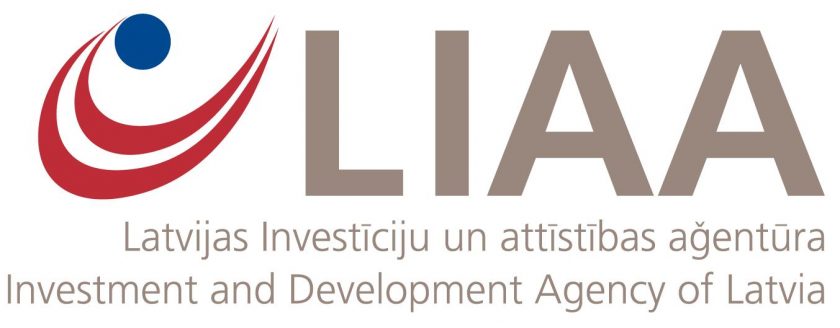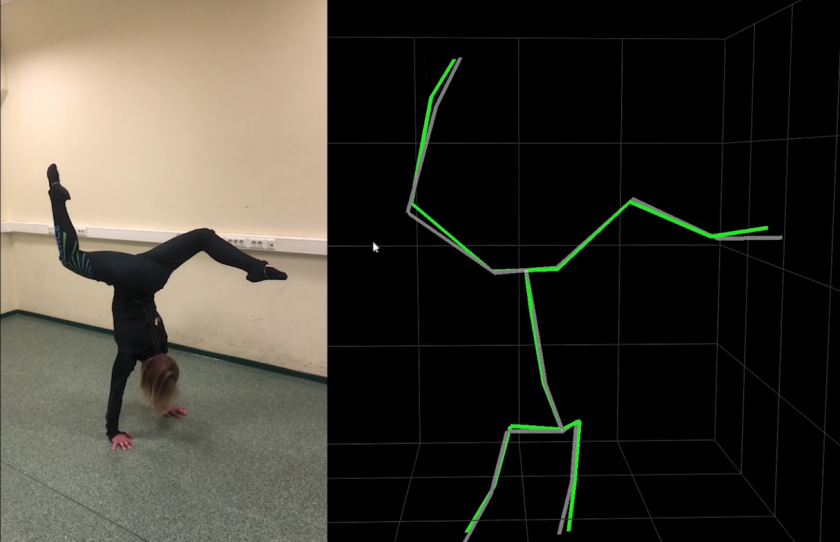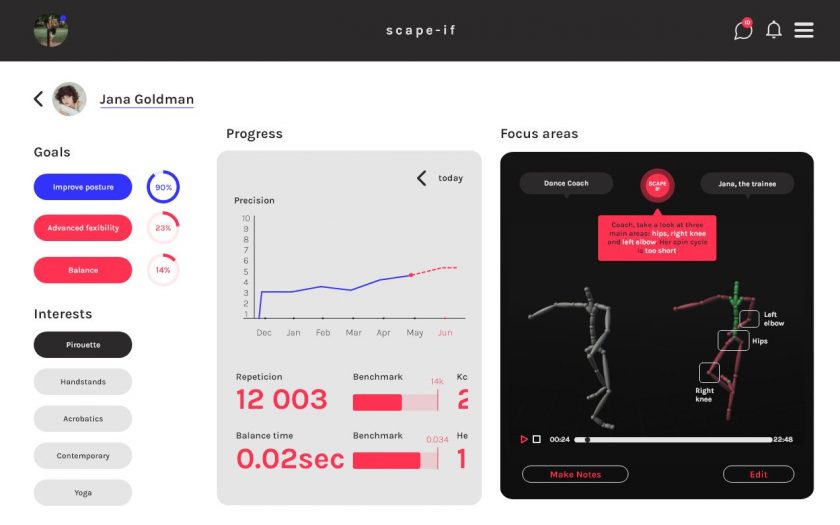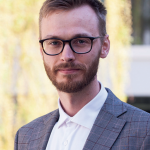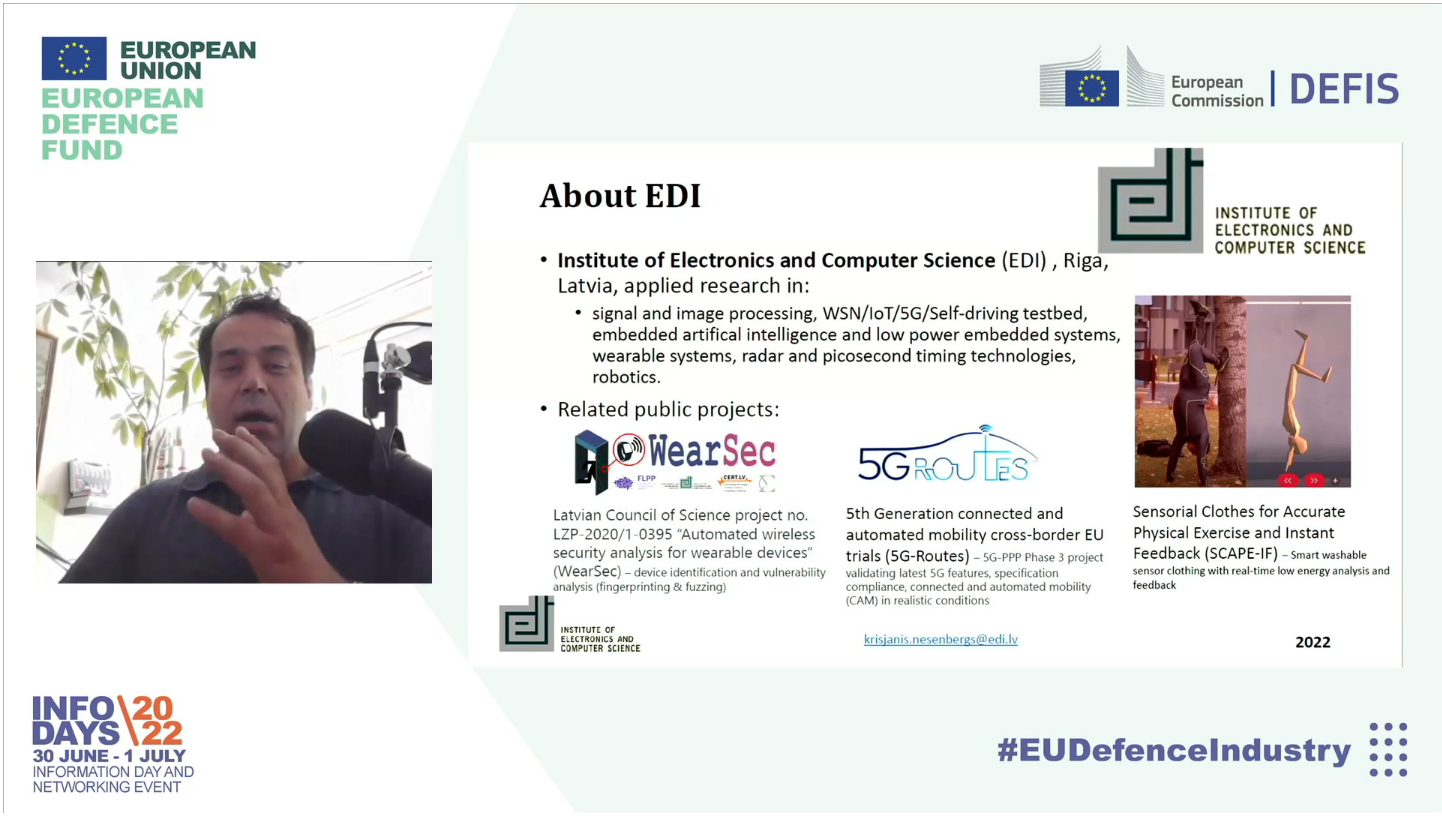European Regional Development Fund Project Application. 1.2.1. specific support goal “To Increase the Private Sector Investments R&D”; measure 1.2.1.2. “Support for Improvement of Technology Transfer System”
Project „Sensorial Clothes for Accurate Physical Exercise and Instant Feedback (SCAPE-IF)” Nr. KC-PI-2020/42
European Regional Development Fund Project Application. 1.2.1. specific support goal “To Increase the Private Sector Investments R&D”; measure 1.2.1.2. “Support for Improvement of Technology Transfer System”
Project „Sensorial Clothes for Accurate Physical Exercise and Instant Feedback (SCAPE-IF)” Nr. KC-PI-2020/42
Agreement with Investment and Development Agency of Latvia (LIAA) No Nr.KC-L-2017/14.
During commercialization process the aim is to increase technology readiness level of developed innovative sensor system technology, that can be basis for products with high added value. This corresponds to RIS3 defined 2nd economy transformation agenda “Future growth sectors, where exist or may emerge products or services with high added value”. Project will be implemented in information and communication technology and smart engineering systems technology development smart specialization areas and correspond to following RIS3 development growth priorities.
Problem:
As per UK survey, 4 out of 10 people are using some form of online workout routine to help them keep physically active. Only 4% were using online resources for home workouts pre-COVID-19 lockdown what is representing a ten-fold increase. Martin Franklin, CEO of Les Mills, points out, that the company’s digital fitness platform has seen a 900 per cent increase in signups as people turn to home workout sessions.
Alongside, as stated by National Safety Council (NSC), in 2017 personal exercise, with or without equipment, accounted for some half million injuries – it’s even more than from basketball or bicycling. Unfortunately, due to COVID-19 and lacking the possibility to effectively consult with a personal coach or a spotter, the injury risk, too, is predicted to increase.
Hence, we see the need for building a solution, that allows people to work out at their own house, flat or garden professionally guided, efficiently and more accurate.
Solution:
Smart sensor clothing, that can measure users movements and pose during workout and by comparing the movements to movements of trainer and proffessional give feedback if excercises are done properly.
Technology:
The technology is based on human body segment orientation measurements using accelerometer, magnetometer and gyroscope sensor fusion. The sensor nodes are placed on predefined positions and knowing human biomechanical model it is possible to reconstruct full 3D model of the human body. This 3D model can be used to precisely measure and analyze human body pose and movements. This kind of information is crucial in many different physical activities such as: exercises, fitness, yoga, athletics, physiotherapy, professional dancing etc.
Market:
Currently there are different sensor-clothing solutions that are trying to penetrate the surprisingly huge fitness market (forecasted revenue in 2020 globally: 22 bil.), however, those solutions are restricted to specific activities like yoga or limited number of exercises. Those restrictions are mostly based on insufficient number of sensors and the content that must be pre-generated by developers, or platform allows users to create and share their own content (exercises and whole training programmes).
Team:
Krišjānis Nesenbergs – scientific manager from 1.03.2021., researcher, techology development;
Ričards Cacurs – scientific manager till 28.02.2021.;
Kristina Oļševska – market researcher, business leader;
Armands Ancāns – researcher, hardware and software development;
Beāte Banga – medical engineeringExpertise in body movements and analysis;
Karlis Reinis Ulmanis – hardware development;
Artis Rozentāls – hardware development;
Bruno Opermanis – machine learning expert;
Artūrs Oņiščenko – Software development and system integration for technology prototypes;
Arnis Ermušs – marketing management.
Contacts:
Krišjānis Nesenbergs – krisjanis.nesenbergs@edi.lv
Kristina Oļševska – kristina.olsevska@edi.lv
News:
On May 21-23, the first international online hackathon event “Sporthack 2020 Latvia” took place – for challenges dedicated to the sports industry – where the team of the Institute of Electronics and Computer Science (EDI) won the first place. Currently, the team was actively involved in the research project SCAPE-IF of the Institute of Electronics and Computer Science. The solution offered by the winners aims to improve the quality of training and reduce the risk of injury to those who choose to exercise at home. More about “Sporthack 2020 Latvia”
On July 2, At the Institute of Electronics and Computer Science, eight business leaders involved in LIAA commercialization projects discuss progress and share their experience in the pre-trial phase.
On July 21, Project „Sensorial Clothes for Accurate Physical Exercise and Instant Feedback (SCAPE-IF)” Nr. KC-PI-2020/42 representatives meet with representatives from the National Rehabilitation Center “Vaivari”. The technology to be commercialized is presented and its potential application to improve the rehabilitation process is discussed. Possible cooperation is being discussed to validate the applicability of this technology in rehabilitation.
On July 23, Project „Sensorial Clothes for Accurate Physical Exercise and Instant Feedback (SCAPE-IF)” Nr. KC-PI-2020/42 representatives meet with representatives from Riga Secondary School of Choreography. During the meeting, the technology to be commercialized is presented and its potential application in the ballet training process is discussed.
During august and september team is working on Technical economical feasibility study and Commercialization strategy documents.
On 4th of september, researcher Ričards Cacurs visits newly revealed research center for health care sports research center at the Latvian Academy of Sports Pedagogy. During visit, researcher is introduced to BTS gaitlab system, that provides measurement of human body motions in 3D space with accuracy of <0.1mm. Possibility for using this system to validate accuracy of developed sensor system is discussed.
In the period from 01.07.2020. until 30.09.2020. the team was working on the preparation, finalization, formatting and translation of the Feasibility Study. An action plan for commercialization activities was also developed, a project budget was drawn up and cash flow was planned for the project implementation period. Different commercialization models have also been analyzed, and their economic rationale assessed.
All deliverables planned in the project and their translations have been submitted within the deadline set by LIAA.
On January 1, 2021, the second phase of the project “Sensorial Clothes for Accurate Physical Exercise and Instant Feedback (SCAPE-IF)” was started.
With a total financing of 293601.00 EURO, of which LIAA investment 264241 EURO and EDI co-financing 29360 EURO.
February 25, 2021 An article about the project has been published on Labsoflatvia.com (news in innovations, technologies, science, research and business) https://labsoflatvia.com/aktuali/viedais-sporta-terps
May and April have been quite productive for the SCAPE-IF project.
One of the most important activities we are proud of is an experiment with Riga Ballet School on April 14, during which, taking into account all safety measures, we asked two professional ballet dancers to perform both simple exercises, wearing our smart costume with built-in motion sensors, as well as complex ballet poses where proper joint placement is essential. Also, during the experiment, we asked a member of the SCAPE-IF team to imitate these movements, thus testing in real life different performances of the same movements and trying to find common denominators to determine when the movement was performed correctly and when it was not.
Equally important was our participation in the annual Researchers’ night on 30 April. As part of this, SCAPE-IF team members – Krišjānis Nesenbergs and Kristina Oļševska – presented both a video of the ballet experiment and talk about SCAPE-IF technology and future plans of this project.
From May 14 to 16, the team also participated in the “LMT IoT hackathon”, during 48 hours intensively worked on the SCAPE-IF application trainer’s view design and functionality, as well as the process of comparing the same movements of two different people.
Also, the major recent activities have been about and around the creation of sportswear for everyday use, we have addressed several companies that will help with both functional design and sewing.
SCAPE-IF Commercialization Experts – Arnis Ermušs and Kristina Oļševska – along with Scientific leader, researcher – Krišjānis Nesembergs – and LIAA will attend the largest networking event of this year – GITEX GLOBAL 2021-, which will take place from October 17 to 21 in Dubai (subject to epidemiological safety conditions), and in order to successfully carry out commercialization activities and address potential buyers of technology, the whole month of August has been spent working on the development of various descriptive materials and mobile application prototype, and the design of new clothing prototype.
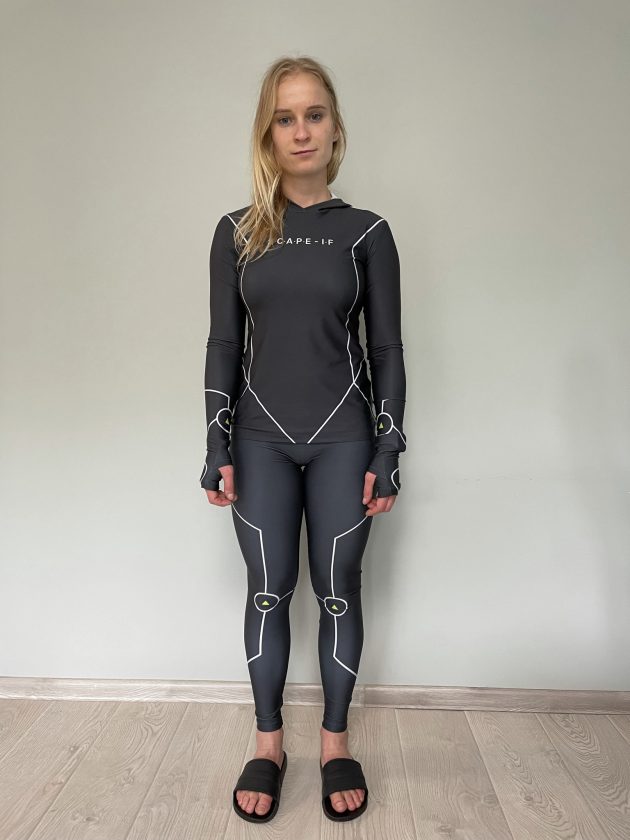
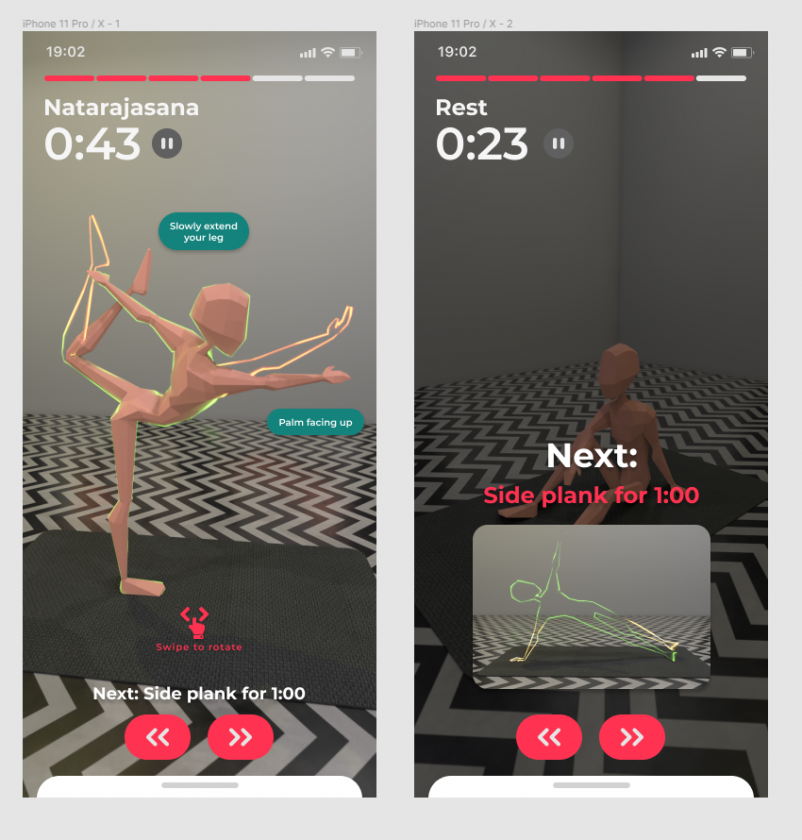
Screenshot of the application UX/UI and clothing prototype.
01.12.2021 – 28.02.2022
In the SCAPE-IF project, the development of the sensor technology system prototype has been continued by implementing the most important changes that have crystallized in the discussions with potential investors and end users. Work has been done on the visual design of the next version of the suit, which will be created in the next stage by combining the latest technological developments with an updated textile design of the suit. Options for embedding wire connections into the fabric in a way that would allow automation and reduce manual labor were evaluated. The latest prototype of a wearable sensor technology system has been used to collect data from several real life exercises. Suit washability and usability tests were performed and the capabilities and limitations of the associated commercialized technology were documented in a transparent form for investors. Negotiations were held with potential mass producers of the suit. The project staff participated in the international exhibition CES, USA and the exhibition MWC Barcelona, Spain, where technology demonstrations were carried out for technology users and potential licensees. Continued work on searching and contacting potential licensees. Organized individual conversations with potential investors and technology demonstrations to attract them.
01.03.2022 – 31.05.2022
In the SCAPE-IF project, the prototype development of the sensor technology system was completed by introducing the most important changes, which were crystallized in the discussions with potential investors and end users. In the latest prototype version of the system, the wiring in the fabric has been improved, as well as a new electronics and box design has been developed for the data collection node. Technical description of wiring solution for a patent application has been prepared. The integration of textile materials and sensor technology system prototype developed in the prototype development activity of Wearable sensor technology system has been completed, the introduction of the visual design of the new suit in a form suitable for more effective demonstration of the technology to potential investors, as well as marketing activities. The prototype of the suit was tested in data acquisition from real exercises. Completed mobile application prototype development, with special emphasis on needs identified in conversations with potential investors and end users, as well as debugging for a more efficient demonstration of the app. App validation with its target audience. Development of pose correction algorithm. Documenting the developed algorithms for transfer in the commercialization process. Using the updated version of the suit, a larger amount of data from real exercises is obtained. Obtained data on the technical parameters of the garment in practical use and the results of testing the prototype of the suit are documented for transfer to the purchasers or licensees of the technology. The suit’s washability and resistance to damage were also tested. Continued negotiations with potential mass producers of the suit. Technology demonstration for technology users and potential licensees. Organized technology demonstrations to attract investors. Participation in the Deep Tech Atelier 2022 with a presentation and live demonstration of the technology, as well as discussions with entrepreneurs who attended the event.
In the SCAPE-IF project, discussions with potential buyers of intellectual property continued and the necessary documentation for commercialization was prepared (including license agreement document, technology evaluation and other documentation for the auction with an upward step, which is expected to be announced at the beginning of June). Signed NDA with potential interested parties for further negotiations.
01.06.2022 – 30.09.2022
In the SCAPE-IF project, negotiations with potential mass producers of the suit have continued. Conducted a technology demonstration for potential licensees. Work is ongoing on searching for and addressing potential licensees, informing about the announced auctions, inviting them to participate both directly and through social networks, etc.
Summary
In the project “Sensory clothing for correct physical activities with feedback (SCAPE-IF)” identification number KC-PI-2020/42, the results have been achieved. The non-exclusive license agreement between the State Scientific Institute – the derived public entity “Electronics and Computer Science Institute” and Husky Sense SIA was concluded on November 17, 2022.

